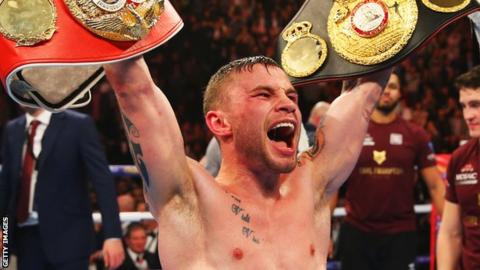
Former world champion Carl Frampton and a number of other high-profile fighters have hit out at the decision to allow professionals to box at the Olympics.
International boxing federations voted in the rule change just weeks before the Rio Games start on 5 August.
Northern Irishman Frampton says amateur and pro boxing are “two different sports”, claiming: “It’s like a badminton player playing tennis.”
Ricky Hatton, Richie Woodhall and Stephen Smith also criticised the move.
“Goodbye amateur boxing now,” tweeted former welterweight and light-welterweight world champion Hatton. “Can’t say I’m a fan of this.”
Woodhall, a former world super-middleweight champion who won a bronze medal at the 1988 Olympics, felt the motive for the change was to give amateur boxing more sparkle.
But he told BBC Radio 5 live: “I really believe that the sport is attractive enough at amateur level in the Olympics.”
Former Commonwealth Games gold medallist Smith, who has had 28 fights as a pro, said he was “gutted” to learn the news.
“Absolutely ruins amateur boxing that in my opinion,” he tweeted. “Wrong.”
However, Olympic medallist Michael Conlan say he is happy to fight against professionals as he seeks to add gold to the bronze he won in London.
“It wouldn’t bother me, I’ll beat all of them,” said the Ireland bantamweight.
The vote to allow pro boxers to fight at the Olympics took place at a meeting of the International Boxing Association (AIBA) in Switzerland.
The decision means any professional can enter a qualifying event in Venezuela next month in an attempt to win selection, with 26 entry places up for grabs.
How many pros will compete in Rio?
AIBA president CK Wu said it was “difficult to anticipate” how many would attempt to qualify, but Woodhall does not think the big names will bother.
That view was echoed by David Price, a former British heavyweight champion who won bronze at the 2008 Olympics.
“It’s 10 weeks away from Rio, so I don’t think we’re going to see too many professionals go through,” he told BBC Radio 5 live.
“I think it’s too soon. I think what they’re doing is just letting everyone know that in future this is how it’s going to be.”
The British Amateur Boxing Association only has two spots left to fill for Rio and is not expected to select any professional fighters for the Games.
Former world heavyweight champion Wladimir Klitschko, 40, has indicated he would like to box at the Olympics but is unlikely to take part in qualifying.
The Ukrainian, who won Olympic super-heavyweight gold in 1996, takes on Britain’s Tyson Fury in a title rematch on 9 July.
Would the pros beat the amateurs?
Not according to former WBA and IBF super-bantamweight champion Frampton, who boxed as an amateur before turning professional in 2009.
“A lot of people are saying it would be unfair for amateurs because the top pros would wipe them out, but that’s not the case,” he said.
“I believe the top amateur boxers in the world would be able to compete with the world’s top professionals over that three-minute round format with soft amateur gloves on.”
Last week, former world heavyweight champion Mike Tyson said: “Some pro fighters are going to get beat by the amateurs.”
There are several differences between amateur and professional boxing but the main one concerns the length of a fight.
Amateurs usually fight over three rounds, each lasting three minutes, but can box for several days in a row during a major tournament.
Professionals have fewer fights but each bout is run over a minimum of four rounds and a maximum of 12, with each round lasting three minutes.



